SEO for personal injury law firms is notorious for how expensive and competitive it can be. Even with paid ads, it’s common for every click from the ad to your website to cost hundreds of dollars:

When spending this kind of money per click, the cost of gaining new cases can quickly skyrocket. Since SEO focuses on improving your visibility in the unpaid areas of search engines, you can cut costs and get more leads if you’re savvy enough.
Here are the strategies I’ve used to help new and boutique injury and accident law firms compete with the big guns for a fraction of the cost.
Recommendation
Unlike many other local service businesses, personal injury law firms need to work harder to earn trust and credibility online.
This applies to earning trust from humans and search engines alike. Google has a 170-page document called the Search Quality Rater Guidelines. This document contains two frameworks law firms can use to help Google and website visitors trust them more.
The first is “your money or your life,” or YMYL. Google uses this term to describe topics that may present a high risk of harm to searchers. Generally, any health, finances, safety, or welfare information falls into this category. Legal information is also a YMYL topic since acting on the wrong information could cause serious damage or harm to searchers.
The second framework is EEAT, which stands for experience, expertise, authoritativeness, and trustworthiness.
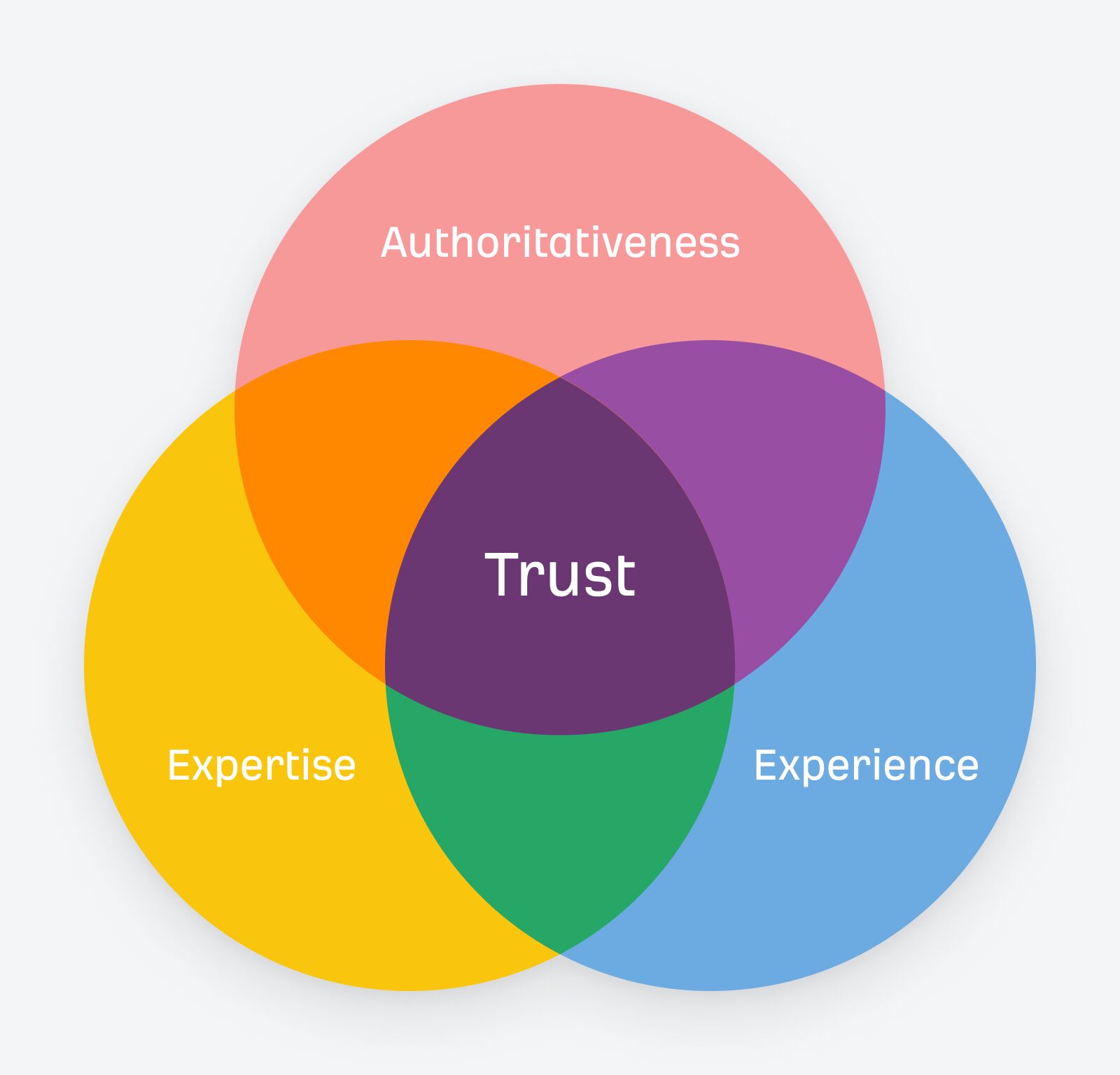

This framework applies more broadly to all industries and is about sharing genuine information written by experts and authorities for a given topic. Both YMYL and EEAT consider the extent to which content is accurate, honest, safe, and reliable, with the ultimate goal of delivering trustworthy information.
Here are the things I implement for my personal injury clients as a priority to improve the trustworthiness of their online presence:
- Prominently display star ratings from third-party platforms, like Google or FaceBook reviews.
- Show your accreditations, certifications, awards, and the stats on cases you’ve won.
- If government-issued ratings or licenses apply to your practice areas, show those too.
- Add contact information like your phone number and address in the footer of every page.
- Share details of every member of your firm, highlighting their expertise and cases they’ve won.
- Add links to your professional profiles online, including social media and law-related listings.
- Include photos of your team and offices, results, case studies, and success stories.
Generally speaking, your Google Business listing can account for over 50% of the leads you get from search engines. That’s because it can display prominently in the maps pack, like so: 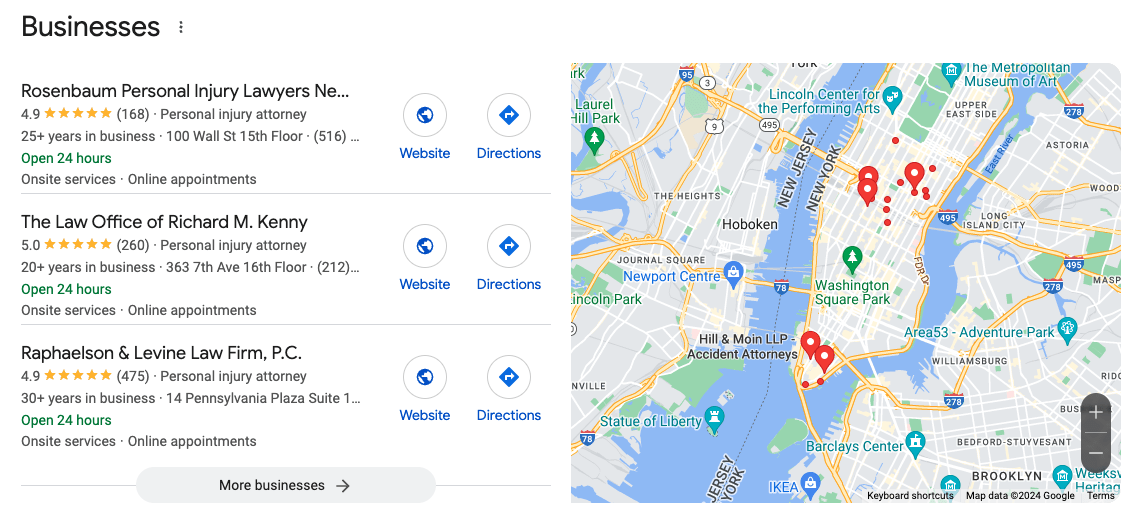
 Without a Google Business listing, your firm will not show up here or within Google Maps since it is managed completely separately from your website. Think of your Google listing like a social profile, but optimize it like a website. Make sure you create one of these for each location where you have an on-the-ground presence, ideally an established office.
Without a Google Business listing, your firm will not show up here or within Google Maps since it is managed completely separately from your website. Think of your Google listing like a social profile, but optimize it like a website. Make sure you create one of these for each location where you have an on-the-ground presence, ideally an established office.
Take the time to fill out all the details it asks for, especially:
- Your firm’s name, address, and phone number
- Your services with a description of each
- Images of your premises, inside and outside the office
And anything else you see in these sections: 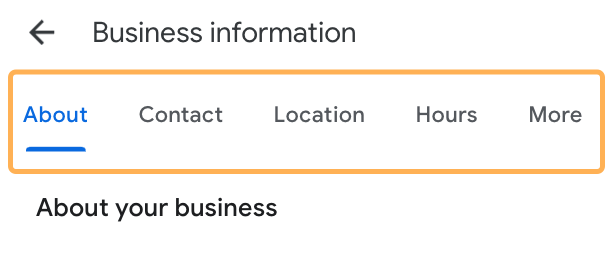

Also, make it a regular habit to ask your clients for reviews.
Reviews are crucial for law firms. They are the number one deciding factor when someone is ready to choose a law firm to work with. While you can send automated text messages with a link to your Google profile, you’ll likely have a higher success rate if you ask clients in person while they’re in your office or by calling them.
I’ve also seen success when adding a request for a review on thank you pages.
For instance, if you ever send an electronic contract or invoice out to clients, once they’ve signed or paid, you can send them to a thank you page that also asks for a review. Here’s my favorite example of this from a local accountant. You can emulate this concept for your own website too:
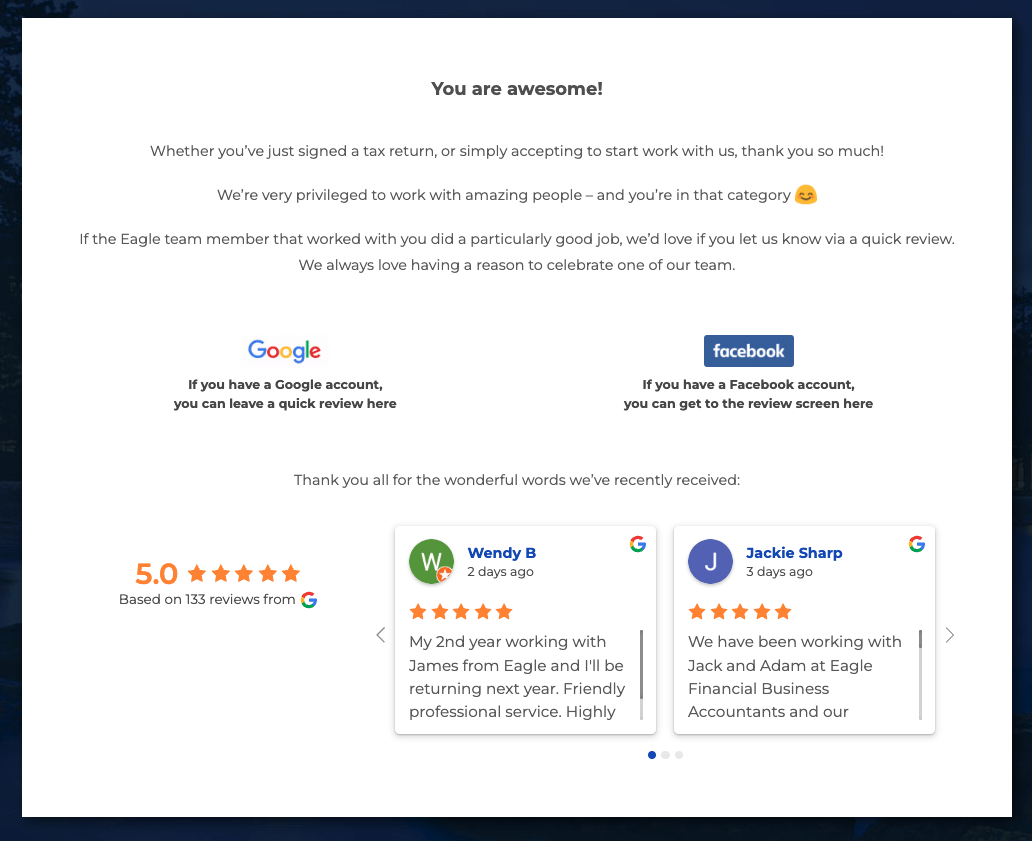

Recommendation
The most common way that people search for legal services is by searching for things like “personal injury lawyer near me” or “car accident lawyer new york”.
For instance, take a look at the monthly search volume on these “near me” keywords for an injury and accident lawyer:
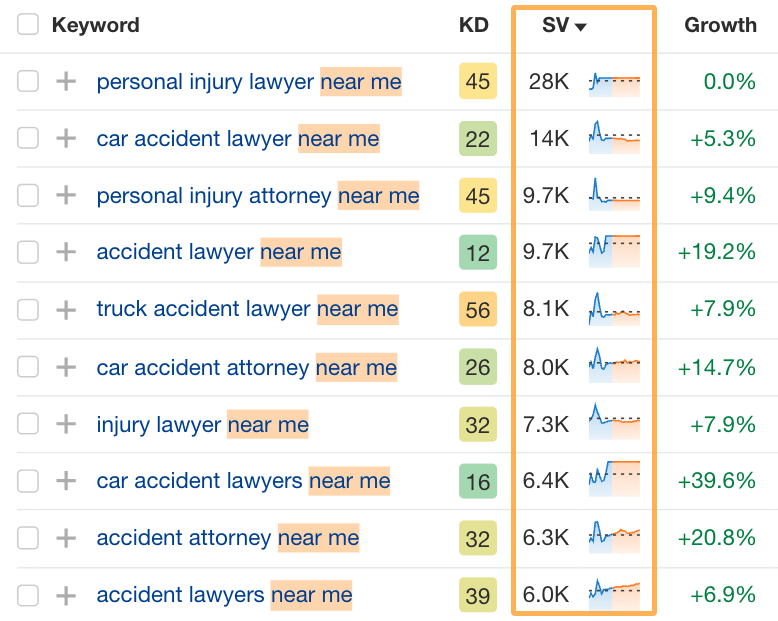

People also commonly search at a state, city, and even suburb level for many legal services, especially if it’s an area of law that differs based on someone’s location. To optimize your website architecture for location keywords like these, it’s best practice to create dedicated pages for each location and then add sub-pages for each of your practice areas in that location.
For example, here’s what that would look like:
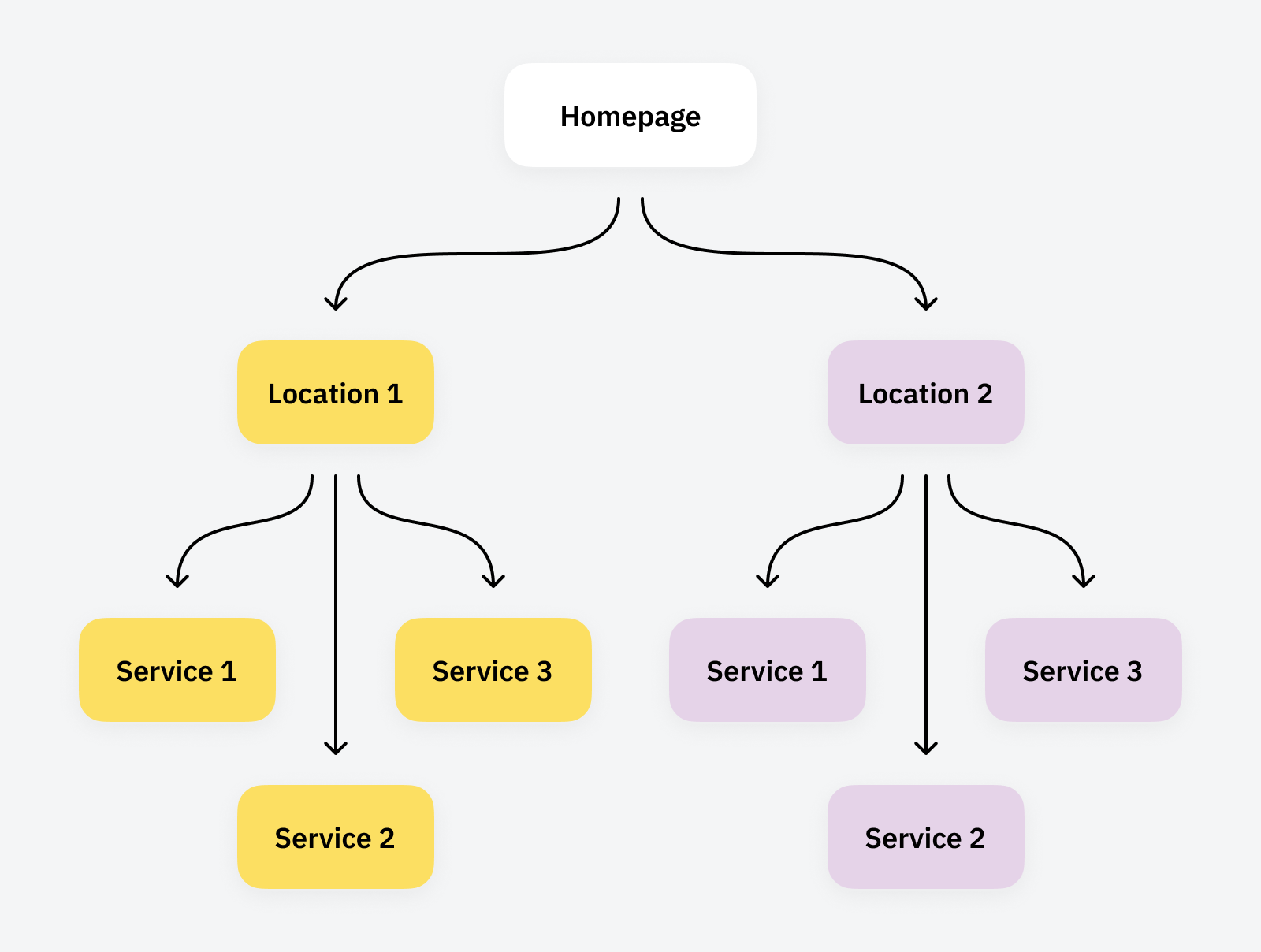

The corresponding URL structure would look like this:
- /new-york
- /new-york/car-accident-lawyer
- /new-york/personal-injury-lawyer
- /new-york/work-injury-lawyer
Pro Tip:
Check out my guide on franchise SEO for local and national growth strategies if you have many offices nationwide.
A topic hub is a way to organize and link between related articles on a website. It’s sometimes referred to as a topic cluster because it groups together pages that are related to the same subject matter.
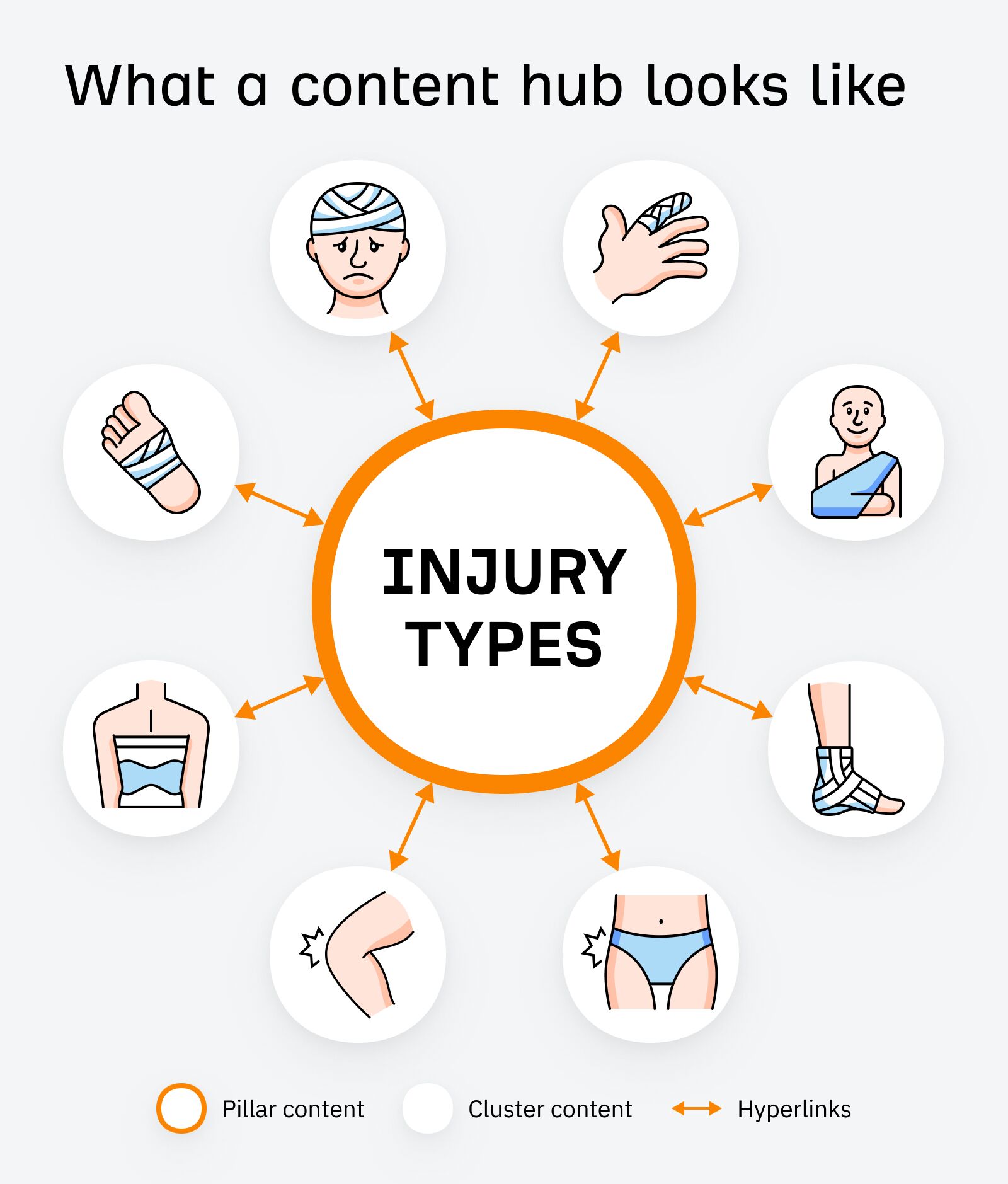

If you run a small firm or your marketing budget is tight, I recommend focusing on a single area of law and turning your website into a topical hub. You can do this by publishing different types of content, such as how-to guides, answering common questions, and creating landing pages for each of your services.
For example, if you currently offer services for immigration law, criminal defense, and personal injury compensation, each appeals to very different audience segments. They’re also very competitive when it comes to marketing, so focusing your efforts on one of these is ideal to make your budget go further.
Most areas of law are naturally suited to building out topic clusters. Every practice area tends to follow a similar pattern in how people search at different stages in their journey.
- Top-of-funnel: When people are very early in their journey, and unaware of what type of lawyer they need, they ask a lot of high-level questions like “what is a car accident attorney”.
- Mid-funnel: When people are in the middle of their journey, they tend to ask more nuanced questions or look for more detailed information, like “average settlement for neck injury”.
- Bottom-of-funnel: When people are ready to hire an attorney, they search for the practice area + “attorney” or “lawyer”. Sometimes they include a location but nothing else. For example, “personal injury lawyer”.
This pattern applies to most areas of law. To apply it to your website, enter your main practice area and a few variations into Keywords Explorer:
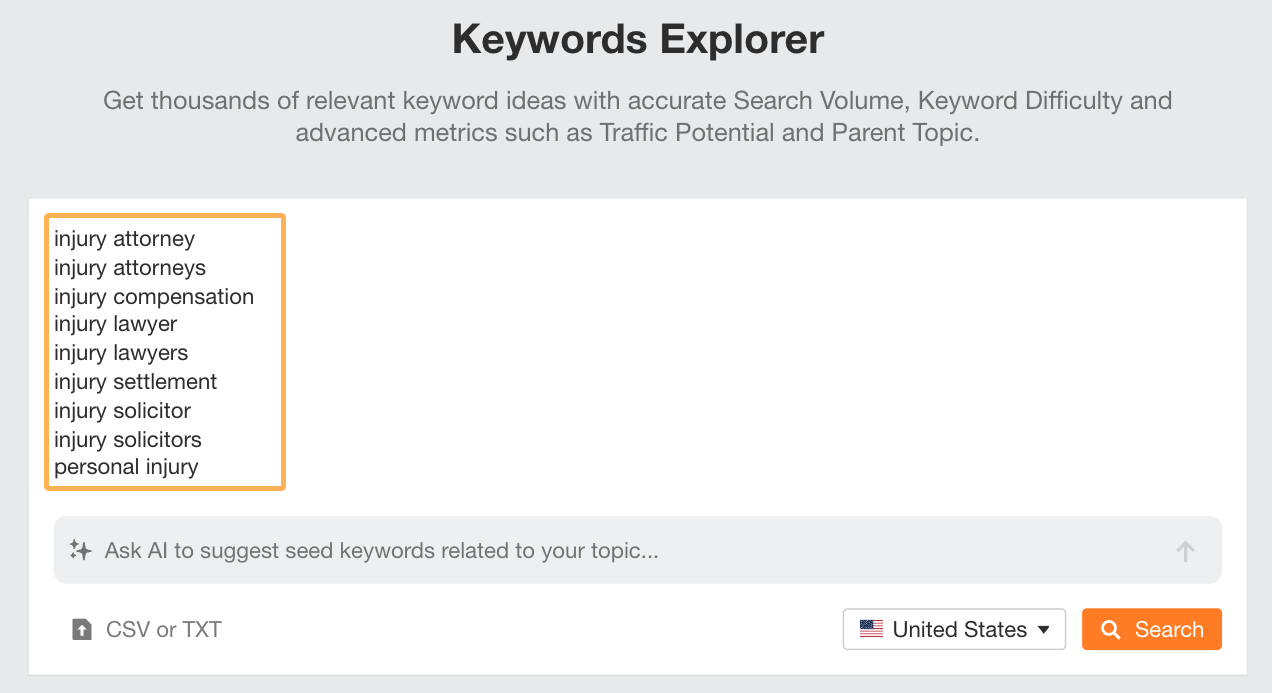

Make sure to include a few different variations like how I’ve added different ways people search for lawyers (lawyer, attorney, solicitor) and also for other related terms (compensation, personal injury, settlement).
If you check the Matching terms report, you’ll generally get a big list that you’ll need to filter to make it more manageable when turning it into a content plan.
For example, there are 164,636 different keyword variations of how people search for personal injury lawyers. These generate over 2.4 million searches per month in the US.
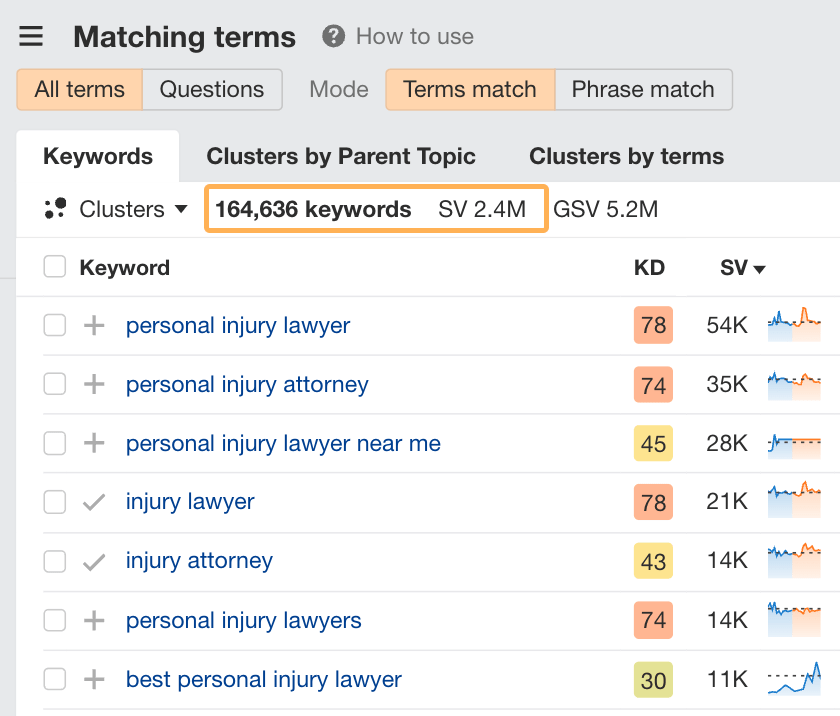

You can make the list more manageable by removing keywords with no search volume. Just set the minimum volume to 1:
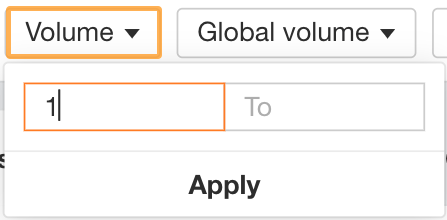

You can also use the include filter to only see keywords containing your location for your location landing pages:
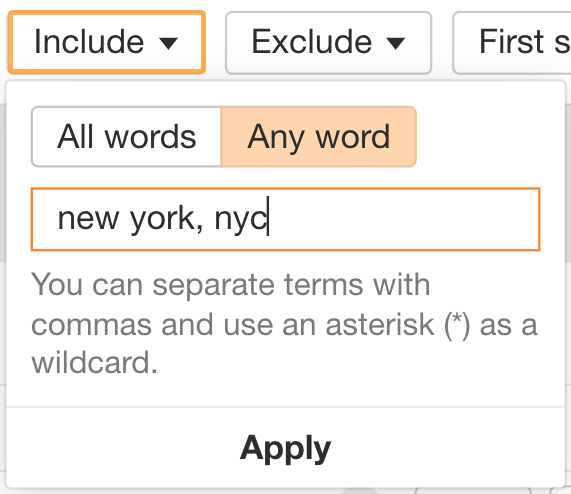

There are also a number of distinct sub-themes relevant to your area of law. To isolate these, you can use the Cluster by Terms side panel. For instance, looking at our list of injury-related keywords, you can easily spot specific body parts that emerge as sub-themes:
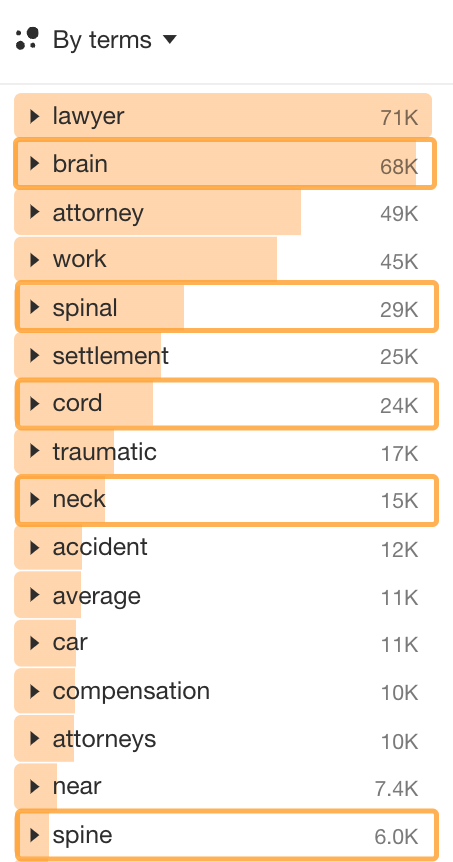

Other sub-themes include:
- How the accident happened (at work, in a car)
- How much compensation someone can get (compensation, average, settlement)
- How severe the injury was (traumatic)
Each of these sub-themes can be turned into a cluster. Here’s what it might look like for the topic of neck injuries:
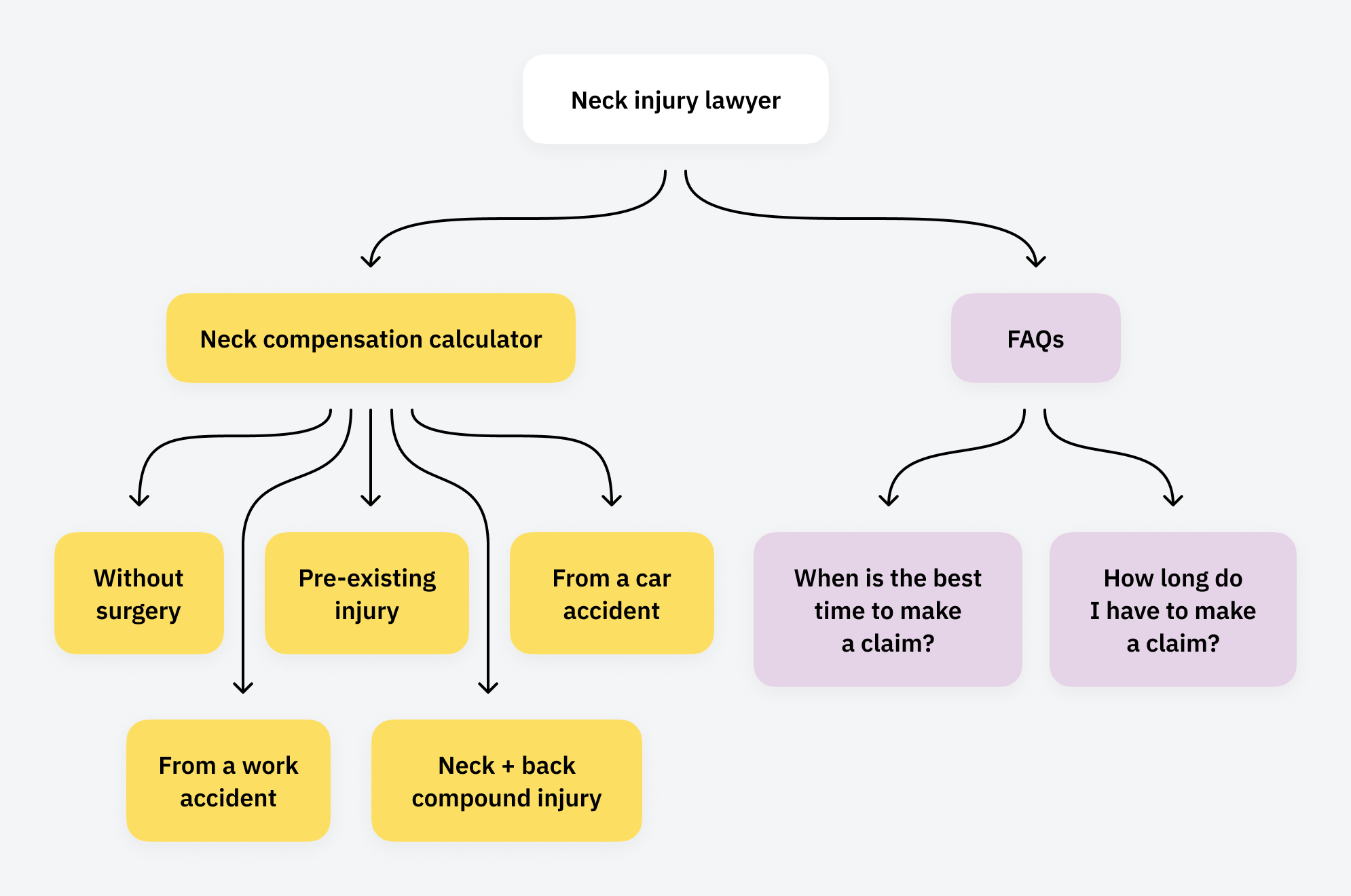

People tend to ask a lot of questions related to most areas of law. As you go through the exercise of planning out your topic clusters, you should also consider building out a knowledge hub where people can more easily navigate your FAQs and find the answers they’re looking for.
Use the knowledge base exclusively for question-related content. You can find the most popular questions people ask after an accident or injury in the Matching terms > Questions tab:
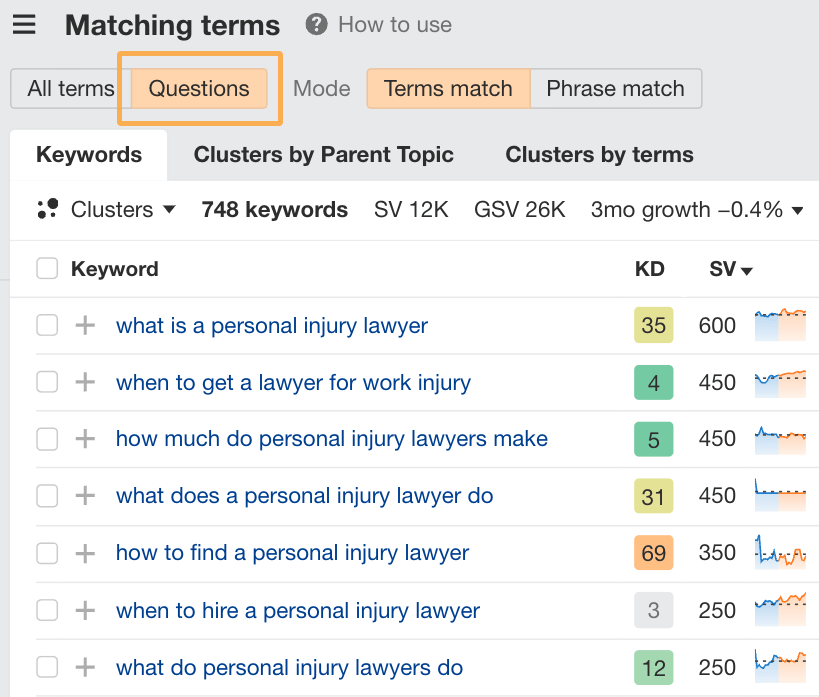

You can also easily see clusters of keywords for the top-of-funnel and mid-funnel questions people ask by checking the Clusters by Parent Topic report. It groups these keywords into similar themes and each group can likely be covered in a single article.
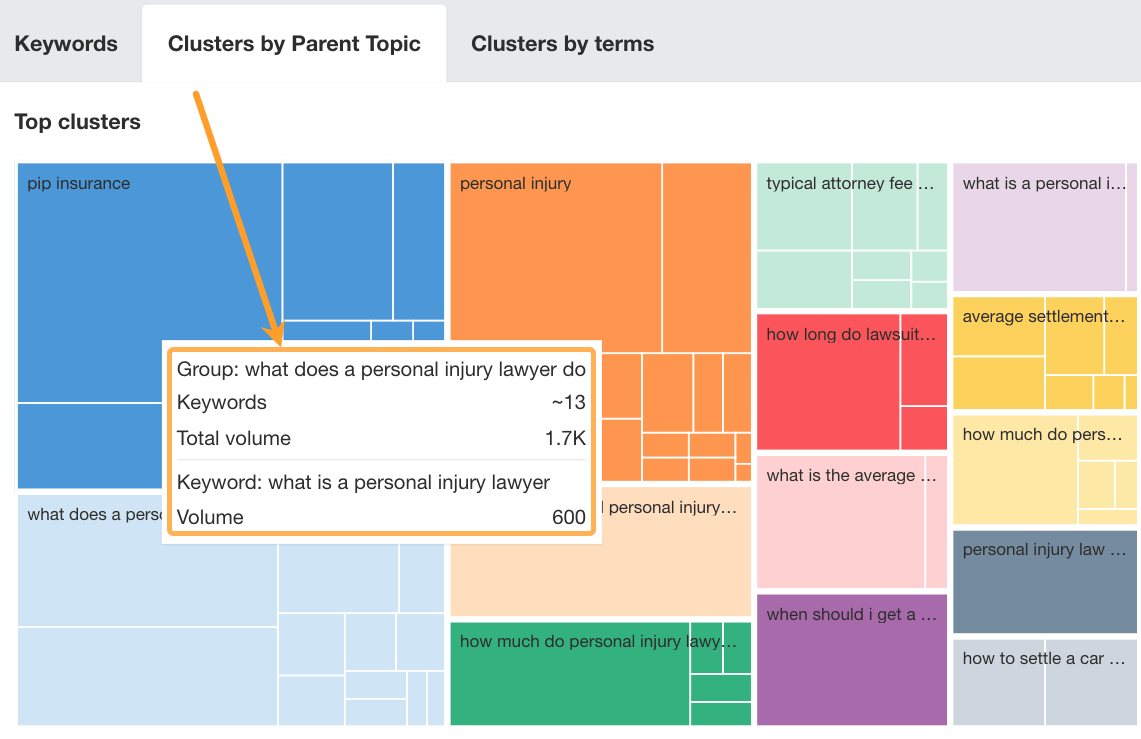

Here’s an example of how Smith’s Lawyers has created a knowledge base with a search feature and broad categories to allow people to find answers to all their questions more easily.
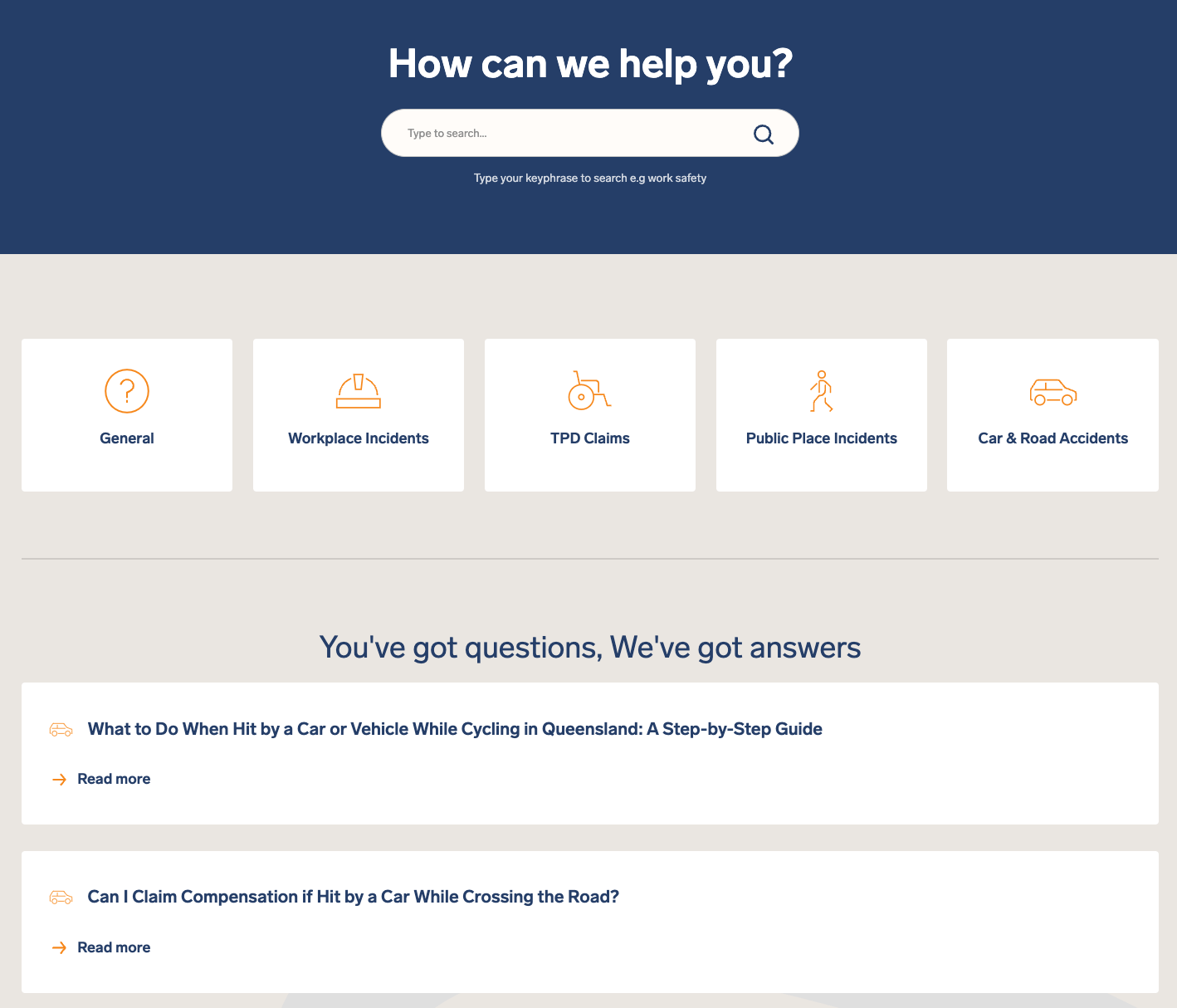

The easier you make it for people to find answers on your website, the less inclined they are to go back to Google and potentially visit a competitor’s website instead. It also increases their interaction time with your brand, giving you a higher chance of being front-of-mind when they are ready to speak to a lawyer about their case.
Some areas of law lend themselves to certain types of interactive content. An obvious example is a compensation calculator for injury and accident claims. Doing a very quick search, there are over 1,500 keywords on this topic searched over 44,000 times a month in the US.
The best part is how insanely low the competition is on these keywords:
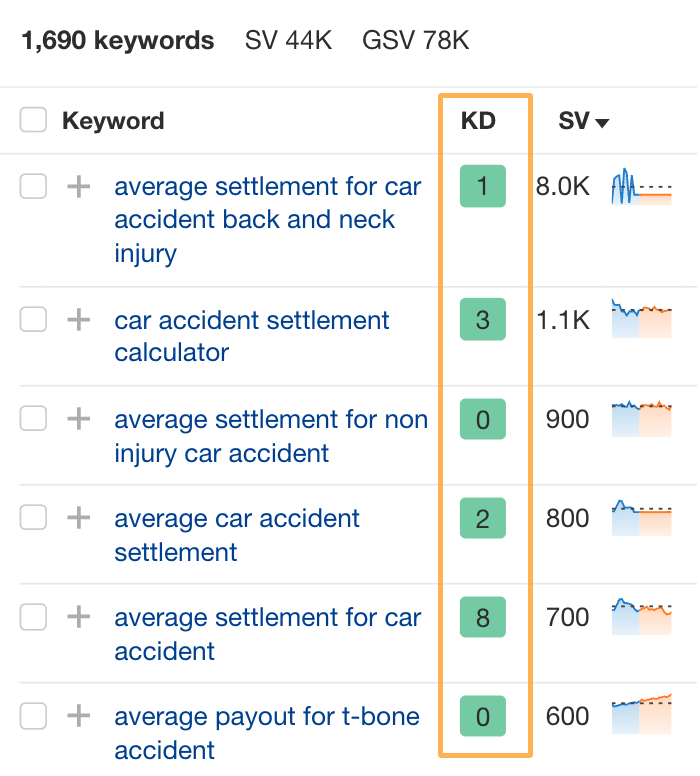

Keyword difficulty is graded on a 100-point scale, so single-digit figures mean there’s virtually no competition to contend with. It’s not all that hard to create a calculator either.
There are many low-cost, no-code tools on the market, like Outgrow, that allow you to create a simple calculator in no time. Other types of interactive content you could consider are:
- Quiz-style questionnaires: great for helping people decide if they need a lawyer for their case.
- Chatbots: to answer people’s questions in real-time.
- Assessments: to pre-qualify leads before they book a meeting with you.
- Calendar or countdown clock: to help people keep track of imminent deadlines.
Backlinks are like the internet’s version of citations. They are typically dark blue, underlined text that connects you to a different page on the internet. In SEO, links play a very important role for a few different reasons:
- Links are how search engines discover new content. Your content may not be discovered if you have no links pointing to it.
- Links are like votes in a popularity contest. The more you have from authoritative websites in your industry, the more they elevate your brand.
- Links also help search engines understand what different websites are about. Getting links from other law-related websites will help build relevancy to your brand.
Think of link building as a scaled-down version of PR. It’s often easier and cheaper to implement. However, it is very time-intensive in most cases. If you’re doing your own SEO, hats off to you!
However, I’d recommend you consider partnering with an agency that specializes in law firm SEO and can handle link building for you. Typically, agencies like these will have existing relationships with law-related websites where they can feature your brand, which will be completely hands-off for you.
For instance, Webris has a database of thousands of legal websites on which they have been able to feature their clients. If you don’t have an existing database to work with and you’re doing SEO yourself, here are some alternative tactics to consider.
Expert quotes
Many journalists and writers benefit from quoting subject-matter experts in their content. You could be such an expert, and every time someone quotes you, ask for a link back to your website. Check out platforms like Muck Rack or SourceBottle, where reporters post callouts for specific experts they’re looking to get quotes from or feature in their articles.
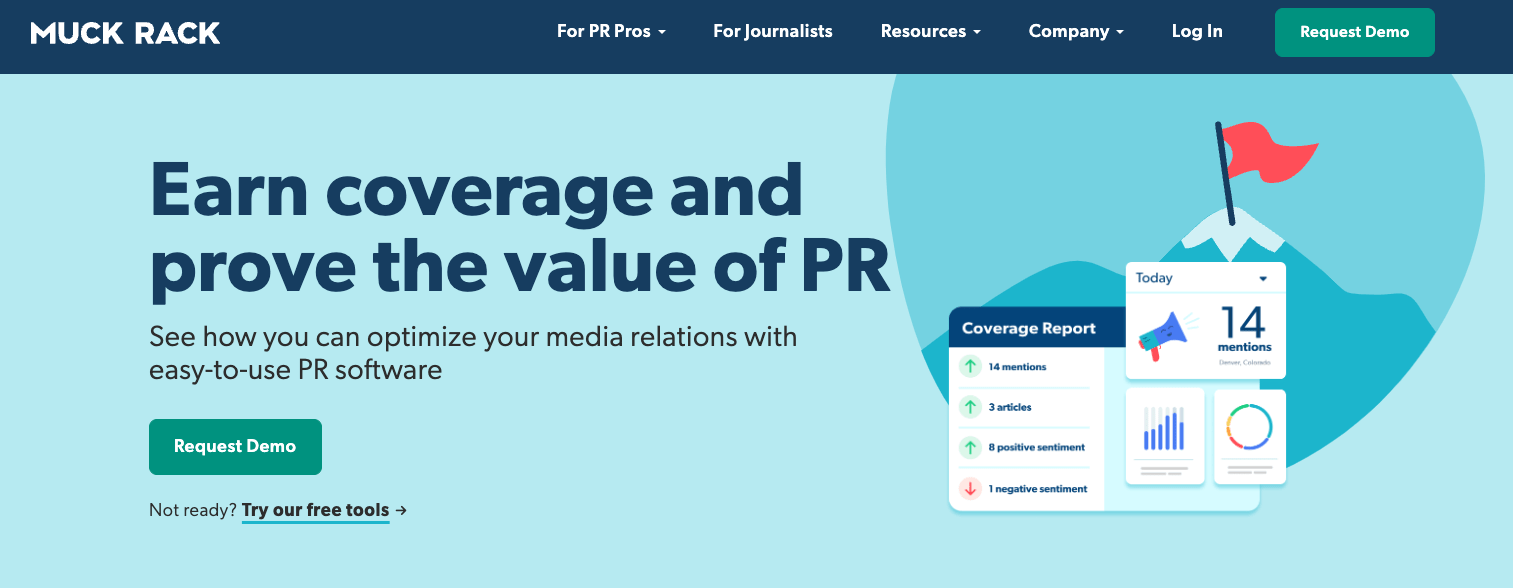

Guest posting
If you like writing content, you can alternatively create content for other people’s websites and include links back to your site. This approach is more time intensive. To make the effort worth it, reach out to websites with an established audience so you get some additional brand exposure too.
Updating outdated content
If you’re checking out other people’s legal content and you ever notice a mistake or outdated information, you could reach out and offer to help them correct it in exchange for a link to your website.
Naturally, you’ll need to recommend updates for sections of content that relate to your practice areas for this to work and for the link to make sense in the context of the content.
Final thoughts
SEO for personal injury lawyers is one of the most competitive niches. High advertising costs and high competition levels make it difficult for new or small firms to compete against industry giants.
As a new or emerging firm, you can take a more nimble approach and outrank the big firms for low competition keywords they haven’t optimized their websites for. It’s all about doing thorough research to uncover these opportunities in your practice area.
Want to know more? Reach out on LinkedIn.




